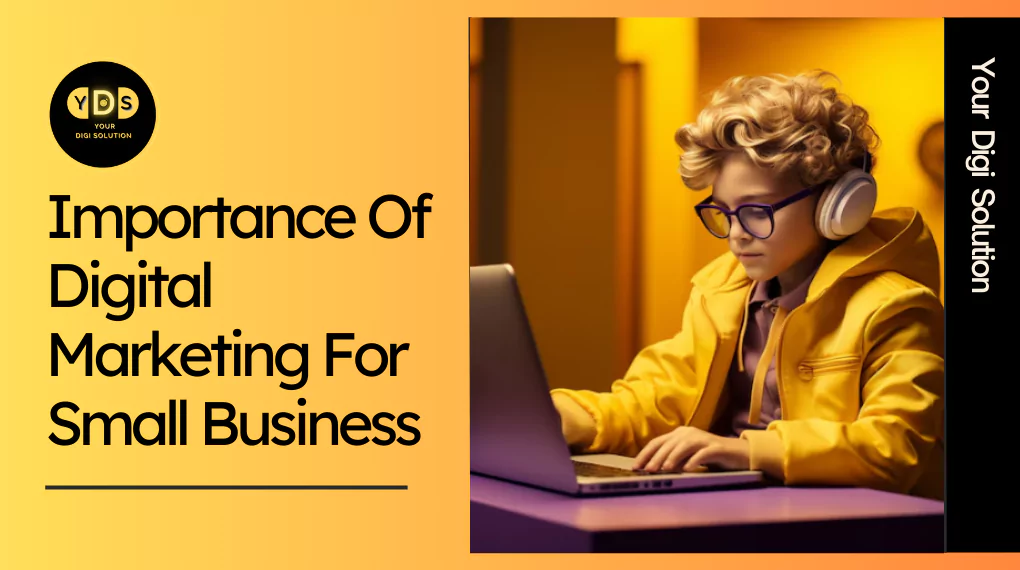Why Digital Marketing Is Important For Small Business

Small businesses often face steep competition and tight budgets, which makes turning to digital marketing a strategic move. By harnessing the web’s power, they level the playing field against larger players with more resources. Even with limited funds, these smaller entities can craft impactful marketing strategies that deliver big results.
Building brand awareness while carefully managing expenses. The rise of digital markets means businesses now reach customers far beyond their local area while getting valuable insights from data analytics tools. Online engagement boosts visibility as small enterprises connect directly with their target audience on social platforms.
Local SEO is crucial for small business success.
Leveling the Playing Field for Small Businesses
For digital marketing, small businesses gain a competitive edge through creative and targeted strategies. For instance, a local bar can craft engaging articles about superior local beers they offer – such content resonates with readers and showcases expertise. In addition, social media isn’t just for promotions; it’s an effective tool for real-time customer service responses.
Investing wisely in influencer marketing propels this approach forward. With 22% of marketers allocating up to 20% of their budget here. And another 26% investing over 40%, according to Statista.
The impact is evident. Rather than sheer follower numbers, choosing influencers who share your business’s core values stands paramount. Finding these influencers involves scouring social platforms or using hashtags strategically allowing precise audience targeting within set budgets aligned with brand ethos.
Leveling the playing field indeed.
Affordable Marketing with Big Impact
Digital marketing presents an opportunity for small businesses to make a substantial impact without the hefty price tag associated with traditional methods. By utilizing platforms like Google Ads and Facebook Ads Manager, enterprises can pinpoint exact customer profiles, focusing on specific demographics that are most inclined towards their offerings. This precise targeting is fortified by analysis – it’s not about casting a wide net but refining approaches to capture ideal leads.
Furthermore, real-time interaction online isn’t just prompt; it builds rapport with potential clients right where they spend their time. Search engine optimization (SEO) plays into this strategy as well: optimizing web content bolsters visibility in search results leading to increased organic traffic sans ongoing costs per click or impression.
What sets digital tactics apart significantly from old-school advertising is its adaptability; you aren’t locked into prolonged campaign cycles. Instead of stalling for season-end reports, immediate feedback allows quick pivots towards what resonates best with your audience. The agility available through these channels means budgets remain flexible.
Start small and scale up comfortably as returns validate expenditure increases. A boon particularly vital when each dollar must count toward actual business growth.
Expanding Customer Reach in a Digital World
In today’s digital landscape, businesses must harness social media to extend their customer reach. With strategic planning, a company can bolster its brand visibility by engaging directly with consumers on various platforms. Such interaction fosters loyalty and enhances satisfaction.
Selecting the right platform is critical; Instagram draws customers seeking visual content while LinkedIn connects professional services with business professionals. Facebook and Twitter’s wide appeal facilitates diverse content sharing. And thus serves numerous marketing strategies effectively. Crafting an impactful online presence starts simply: use your logo as your profile picture for instant recognition and write a concise bio loaded with relevant keywords about your services or products. Always link back to your website to funnel traffic directly from these profiles.
Measuring Success Through Data and Analytics
In the digital marketing realm, data analysis stands as a beacon for small businesses seeking to thrive. It’s not just about amassing facts and figures; it’s fundamentally interpreting them to guide strategic decisions. SMEs must examine customer trends, sales patterns, and market shifts with an analytical lens to maintain a competitive edge.
Analysis splits into structured assessments of databases or sales reports and diving deep into unstructured resources like social media chatter. Both ripe with insights but varying in complexity. Methods range from simple descriptive analytics summarizing past events to predictive models forecasting future scenarios.
For effective marketing spend, assessing campaign results is vital. I leverage Google Analytics for this purpose. And alter strategies based on those findings.
Small business owners should prioritize consistent data collection using diverse methods such as surveys or website traffic analyses for comprehensive understanding. Storing collected information securely yet accessibly ensures that when mined thoughtfully, data steers companies towards tailored service offerings elevating client satisfaction. A practice I’ve seen foster enduring loyalty firsthand.
Building Brand Awareness Online
For digital marketing, small businesses can enhance brand awareness online through strategic content creation and targeted social media activities. They should focus on platforms where their audience resides rather than spreading thin across multiple channels. Tools like SocialBee enable seamless management of various social networks, integrating Canva for design ease.
Moreover, email marketing remains a potent tool; using services such as HubSpot or Mailchimp aids in reaching out to potential and current customers with promotions or information-rich newsletters. Content marketing extends beyond mere promotion. It encompasses blogs, infographics, videos.
Delivering value that bolsters brand presence. By leveraging these tactics effectively within a well-planned strategy ensuring precise targeting and message customization are paramount for achieving desired outcomes including an uptick in return on investment (ROI). Digital efforts afford flexibility allowing swift adjustments founded on analytic insights thus enhancing overall impact while blending harmoniously with traditional methods to comprehensively meet business objectives.
Increased Engagement on Social Platforms
Harnessing social media’s potential boosts a brand’s interaction with its audience. Businesses can create meaningful connections by utilizing platforms to respond to customer queries and solicit feedback, fostering stronger relationships. Social channels also allow companies to showcase their products vividly, demonstrating value through testimonials or tutorials.
Furthermore, the visibility and reach of a business are significantly amplified on networks like TikTok or Instagram. Venues where many users first encounter new brands. Insights gleaned from these interactions provide valuable data for market research.
To tap into these benefits strategically, businesses should set clear goals that align with their overall marketing strategy and measure success using specific metrics such as engagement rates or web traffic driven by social campaigns.
Cost-Effective Targeted Advertising Strategies
Employing digital marketing strategies, such as SEO and PPC advertising, can maximize a small business’s visibility in the vast online marketplace. For instance, optimizing for search engines boosts website traffic through strategic keyword use and authoritative content that enhances a site’s ranking on platforms like Google. Meanwhile, Pay Per Click (PPC) tactics allow precise budget control while targeting specific audience demographics via platforms including Facebook Ads or Google Ads.
Content marketing plays an indispensable role by providing value-driven material to potential customers; this fosters engagement and extends brand reach with tailored posts designed explicitly around user interests. Influencers also broaden your presence since their significant followings could translate into heightened exposure for your brand when they share sponsored content. This blend of targeted approaches empowers smaller enterprises to stretch their budgets further than traditional methods would permit.
Positioning them competitively alongside more prominent brands without necessitating considerable investments.
Enhancing Local Visibility through SEO Practices
In the competitive online market, small businesses often struggle to shine against larger brands with hefty marketing resources. A strong local SEO strategy levels this uneven playing field by optimizing for keywords specific to their community and services. Essential practices include ensuring consistent NAP details across all platforms.
Like Google Business Profile. And gathering positive online reviews that endorse credibility. BrightLocal’s survey underscores the power of customer feedback; nearly 9 out of 10 consumers dig into these assessments when considering local services.
However, many smaller enterprises overlook such tactics due to limited budgets or lack expertise in evolving search algorithms, which can significantly dampen their digital footprint and reduce client engagement. By concentrating on tailored SEO efforts, less prominent companies boost visibility among neighborhood patrons eagerly searching for niche offerings they provide. An invaluable step towards sustainable growth and heightened brand presence within their area.
Driving Sales with Effective Online Campaigns
For small business, digital marketing is an innovative approach that empowers even modestly-resourced entities to amplify their brand and bolster sales effectively. By harnessing tools like Starter Suite. Businesses can unite marketing with sales in a seamless ecosystem, leveraging unified data paired with artificial intelligence for strategic growth without extensive setup complexities. Notably, search engine optimization (SEO) stands as a cornerstone strategy. It’s about fine-tuning your website so when potential customers scour Google or Bing for products you offer; it’s your site they find first.
Not some large corporation’s page. This isn’t merely haphazard chance but the result of meticulous keyword targeting aimed at enhancing visibility on SERPs. Producing materials genuinely reflective of customer interests increases engagement significantly.
People feel seen and understood by brands who speak directly to them through blog posts or vibrant social media interactions focused on community building. Every campaign should begin with solid groundwork. A thoughtful plan answering critical questions about audience demographics and precise objectives.
Thorough assessments regarding extant resources available within timeframes set against realistic budget considerations are also essential.
Creating Valuable Content to Attract Customers
For digital marketing, creating valuable content is tantamount to building a bridge directly to potential customers. Content that resonates with an audience does more than just inform; it establishes credibility and nurtures relationships. To craft such material, small businesses must dive into understanding their target demographic’s interests and pain points.
From there, engaging blog posts or instructional videos become lighthouses in the vast online sea – attracting leads through relevance and expertise. By integrating SEO techniques like keyword research and site optimization alongside regular social media engagement tailored for specific platforms, these businesses elevate their visibility without relying heavily on costly traditional advertising avenues. Utilizing analytics tools allows them to track performance meticulously.
Ensuring resources are allocated effectively towards strategies yielding the highest return on investment (ROI). Through personalized campaigns founded upon intimate knowledge of customer profiles. From demographics down to online behaviors.
They can carve out a distinct niche within any industry landscape.
Cultivating Customer Loyalty via Digital Channels
In today’s digital landscape, small businesses must utilize online channels to foster customer loyalty effectively. By implementing strategies such as search engine optimization (SEO), these companies can enhance their visibility on platforms like Google where potential customers frequently search for products or services. Social media marketing is another powerful tool, enabling brands to engage in meaningful interactions with their audience through captivating content and real-time communication.
Email marketing campaigns offer a direct line to consumers’ inboxes, allowing personalized promotions and updates that encourage repeat business. Moreover, by producing high-quality content. Be it articles, videos or infographics.
Businesses position themselves as industry leaders while driving website traffic; thisn’t only attracts new patrons but also retains existing ones. Collectively, these methods create an ecosystem of engagement where continuous digital interaction nurtures stronger bonds between brand and consumer. An indispensable factor for long-term success.
Staying Competitive in an Evolving Market
Businesses must stay nimble to remain competitive in a constantly evolving market. Adapting sales strategies and embracing digital marketing innovations are essential steps toward growth. For instance, utilizing customer relationship management (CRM) software can significantly improve lead generation.
A top priority for 91% of marketers. And streamline workflow processes. Integrating CRM with email systems enables automated and personalized communication, enhancing engagement while also driving sales.
Moreover, tools like small business invoice software facilitate efficient billing practices which save precious time. Combining different channels such as SMS with traditional email marketing maximizes reach effectively without additional workload due to the synergy created between these mediums. By leveraging technology advancements like Text 2 Pay payment solutions or optimizing B2B marketing automation, businesses refine their operations.
These advancements also enrich customer experiences, contributing to sustained competitiveness in today’s agile markets.
Digital marketing offers small businesses a chance to compete on the same stage as larger competitors. It’s cost-effective, allows targeted reach, and delivers measurable results. With digital strategies like SEO and social media campaigns, these companies can attract new customers while engaging more deeply with existing ones.
Embracing digital tools for marketing can lead to growth and success in today’s market where online presence is key.



